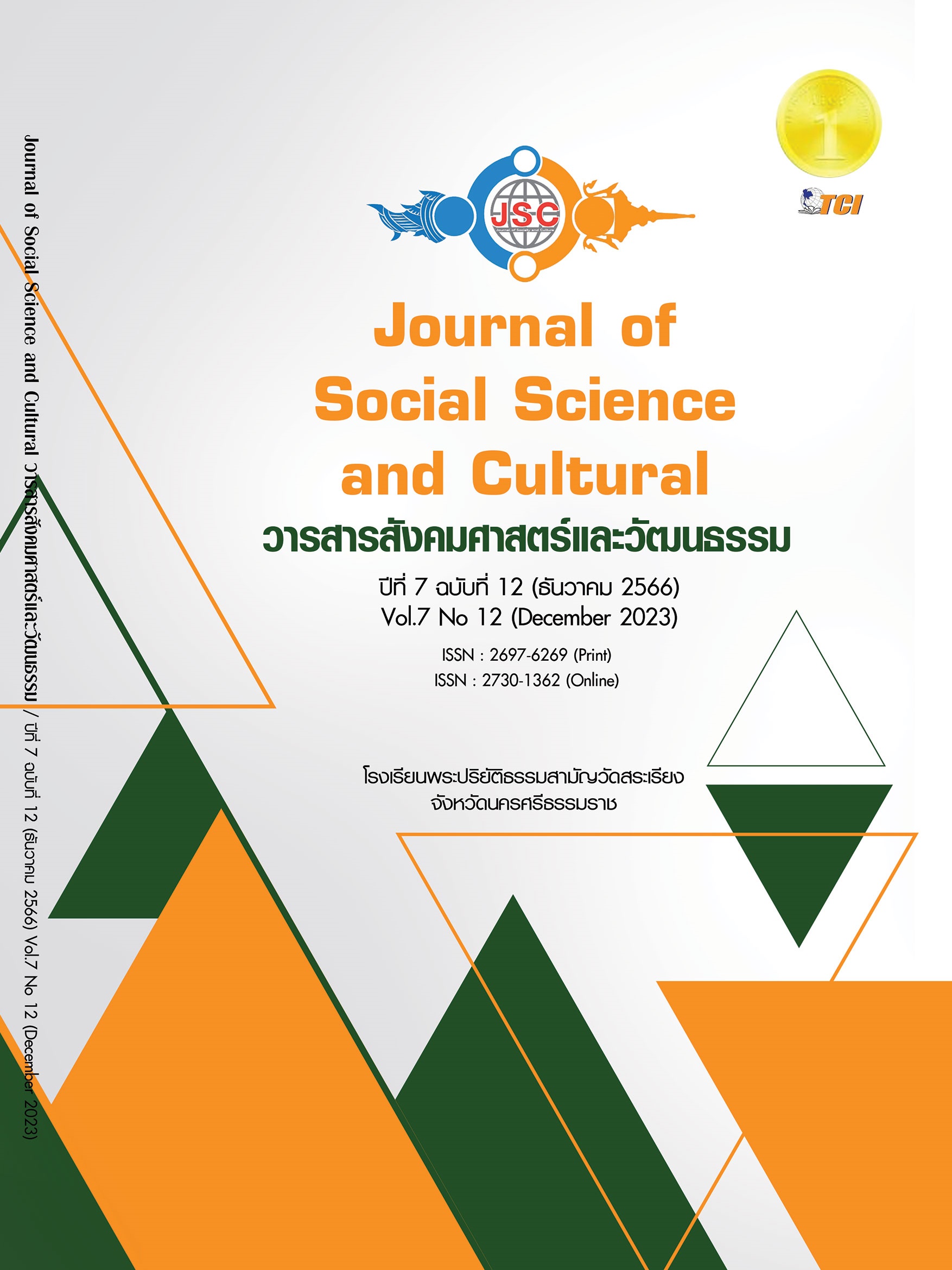THE INFLUENCE OF TRANSFORMATIONAL LEADERSHIP, STRATEGY THINKING AND MANAGEMENT INNOVATION TO JOB PERFORMANCE' S ROYAL THAI ARMY PERSONNEL
Main Article Content
Abstract
This research aims to: 1) study the level of transformational leadership, strategic thinking, management innovation, and job performance' s royal Thai army personnel, 2) examine the influence of transformational leadership, strategic thinking, and management innovation on job performance' s royal Thai army personnel, 3) develop the causal relationship model of the job performance' s royal Thai army personnel. The research is quantitative and utilizes a questionnaire as a data collection tool from a sample group of 280 cavalry soldiers. The sample size is based on 20-time criteria of parameter and a proportional stratified random sampling method. Data is analyzed using mean and standard deviation, and structural equation modeling. The findings revealed that 1) transformational leadership, strategic thinking, management innovation, and job performance' s royal Thai army personnel were all at a high level, 2) strategic thinking, management innovation and transformational leadership influenced the job performance' s royal Thai army personnel at .05 statistical significance level respectively. The three variables together explain 89.0% (R2) of job performance' s royal Thai army personnel, 3) the causal relationship model of job performance' s royal Thai army personnel model was congruent with the empirical data. The model was called SIT Model (S = Strategy thinking, I = Management Innovation, T = Transformational Leadership). The findings of this research can be further applied as a policy guideline for commanders in every unit of royal Thai army to support strategic thinking for their personnel and implement management innovations to use in operations in all unit of royal Thai army.
Article Details
References
กรมกำลังพลทหาร กองบัญชาการกองทัพไทย. (2565). ข้อมูลกำลังพลทหารม้า. เรียกใช้เมื่อ 1 สิงหาคม 2566 จาก https://j1.rtarf.mi.th/new/
กรมยุทธศึกษาทหารบก. (2560). คู่มือยุทธศาสตร์กองทัพบก. กรุงเทพมหานคร: กรมยุทธศึกษาทหารบก.
กระทรวงกลาโหม. (2560). ยุทธศาสตร์การพัฒนา วิทยาศาสตร์ เทคโนโลยี อุตสาหกรรมป้องกันประเทศ กระทรวง กลาโหม พ.ศ. 2560-2579. กรุงเทพมหานคร: กระทรวงกลาโหม.
บุญเชิด ภิญโญอนันตพงษ์. (2545). การวัดและการประเมินผลการศึกษา: ทฤษฎีการ ประยุกต์. กรุงเทพมหานคร: อักษรเจริญทัศน์.
สถาบันวิชาการป้องกันประเทศ. (2561). เอกสารทางวิชาการ เรื่อง แนวทางการพัฒนากองทัพไทยเพื่อรองรับนโยบายThailand 4.0. กรุงเทพมหานคร: สถาบันวิชาการป้องกันประเทศ.
Alatailat, M. et al. (2019). High performance work practices, organizational performance and strategic thinking: A moderation perspective. International Journal of Organizational Analysis, 27(3), 370-395.
Alexe, C-G & Alexe, C-M. (2016). The Importance of the dimensions of the innovation management in evaluating the innovation capability of the firms in the machine building Industry in Romania. Procedia Technology, 22(2016), 999-1005.
Best, J. W., & Kahn, J.V. (2014). Research in Education. (10th Ed.). Harlow England: Pearson Education.
Chen, J. X. et al. (2019). Demystifying the impact of CEO transformational leadership on firm performance: Interactive roles of exploratory innovation and environmental ncertainty. Journal of Business Research, 96(2019), 85-96.
Eisinga, R. et al. (2012). The reliability of a two-item scale: Pearson, Cronbach or Spearman- Brown. International Journal of Public Health, 58(4),637-642.
Gokhan Ourc, O. et al. (2022). The Mediating Role of Management Innovation in the Impact on Agile Leadership on Firm Performance. Journal of Management & Economics Research, 20(2), 205-230.
Hair, J. F. et. al. (2010). Multivariate Data Analysis (7th ed.). New York: Pearson-Prentice Hall.
Hanif, S. et al. (2023). Examining the impact of environmental management accounting practices and green transformational leadership on corporate environmental performance; the mediating role of green process innovation. Journal of Cleaner Production, 414(2019), 85-96.
Hoai, T. T. et al. (2022). The impact of internal control systems on the intensity of innovation and organizational performance of public sector organizations in Vietnam: the moderating role of transformational leadership. Heliyon, 8(2), e08954.
Khan, H. U. R. et al. (2018). Transformational leadership, corporate social responsibility, organizational innovation, and organizational performance: Symmetrical and asymmetrical analytical approaches. Corporate Social Responsibility and Environmental Management, 25(6), 1270-1283.
Kline, R. B. (2015). Principles and practice of structural equation modeling (4th ed.). New York: The Guilford.
Kowang, T. O. et al. (2015). Innovation management and performance framework for research university in Malaysia. International Education Studies, 8(6), 32-45.
Ludwikowska, K. & Tworek, K. (2022). Dynamic capabilities of IT as a factor shaping servant leadership influence on organizational performance. Procedia Computer Science, 207(2022), 34-43.
Mai, N. K. et al. (2022). The impact of leadership competences, organizational learning and organizational innovation on business performance. Business Process Management Journal, 28(5-6), 1391-1411.
Muriithi, S. M. et al. (2018). The relationship between strategic thinking and leadership effectiveness in Kenyan indigenous bank. South African Journal of Economic and Management Sciences, 21(1), a1741.
Ronna C. T. & Laurie C. (2003). Indexes of item-objective congruence for multidimensional items. International Journal of Testing, 3(2), 163-171.
Shahul Hameed, N. S. et al. (2022). The impact of business process reengineering on organizational performance during the coronavirus pandemic: moderating role of strategic thinking. Foresight, 24(5), 637-655.
Toopthong, R. & Buasuwan, P. (2019). A Model of the total innovation management of private higher education. UTCC International Journal of Business and Economics, 11(3), 99-116.
Wanasida, A. S. et al. (2021). Millennial transformational leadership on organizational performance in Indonesia fishery startup. Journal of Asian Finance, Economics and Business, 8(2), 555-562.
Zaw, P. P. & Takahashi, Y. (2022). Effect of transformational leadership on contextual performance mediated by work engagement and moderated by mindful awareness. Merits, 2(4), 241-257.


